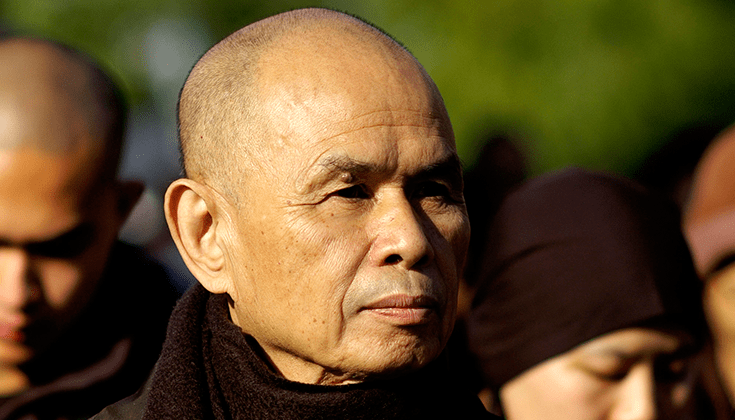Why do you say that you don’t need to be a Buddhist in order to receive the transmission of the five mindfulness trainings?
You don’t need to be Buddhist in order to think with understanding and love. You don’t need to be Buddhist in order to say something nice, full of compassion. So we say that the five mindfulness trainings are global ethics, for Buddhists and non-Buddhists.
The mindfulness practices are very concrete. You cannot talk about them; you have to live them. When you have spent some time in Plum Village, you are motivated by a desire to bring this practice home and to make your family into a kind of Plum Village—you recite the trainings and you practice breathing, sitting, and eating in such a way that it brings happiness and reduces suffering.
I understand the five mindfulness trainings are a concrete way to realize the traditional noble eightfold path—right view, right thought, right speech, right action, right livelihood, right effort, right mindfulness, and right concentration. How does that work?
Right view is the view of interbeing, free from discrimination. And thanks to the insight of interbeing, there is right thinking. Right thinking is thinking without discrimination. When you produce a thought in alignment with right thinking, that thought is full of understanding and compassion. It has the power to heal you and to heal the world. Then with right view—with the insight of interbeing—you can also practice right speech. Whatever you say or whatever you write down, be it an email, article, or a poem, can reflect the spirit of non-discrimination. That is, what you say and write is free from division, fear, hate. It is full of compassion and understanding. You can heal yourself and the world just by right speech. Then right action is what you do with your body. If you’re without discrimination, without fear, everything you do can help the planet survive.
You’ve said that our thoughts, speech, and actions are our continuation. What does that mean?
What you think, what you say, and what you do is your continuation—a kind of energy that will continue for a long time. When your body has disintegrated, you continue onward because of the three kinds of energy that you produce every day. After you leave this active form of being, you acquire other forms of being, because the energy you produce will result in new forms.
It’s like a cloud. When a cloud is no longer a cloud, it is something else, like rain or snow or hail. so when you don’t see a cloud in the sky, you don’t say that it’s no longer there. It is still there in other forms. That is also true with a human being. When you are no longer in this form of body, then your action—your karma, what you produce in terms of thinking and speech and action—is your continuation. That’s why when you practice mindfulness, concentration, and insight, you can assure a good, beautiful continuation in the future.
What is your hope for the future of Plum Village?
We don’t worry about the future. We worry about the present, because we know that if in the present moment we do our best, that is more than enough. That is all we can do for the future. The future depends on the present, so if we put all our hearts into what we are doing here and now, hope is always there. But if we feel helpless in the present moment, there is no hope for the future. Whether the planet is to survive or not depends on today—the way we live our life today.

